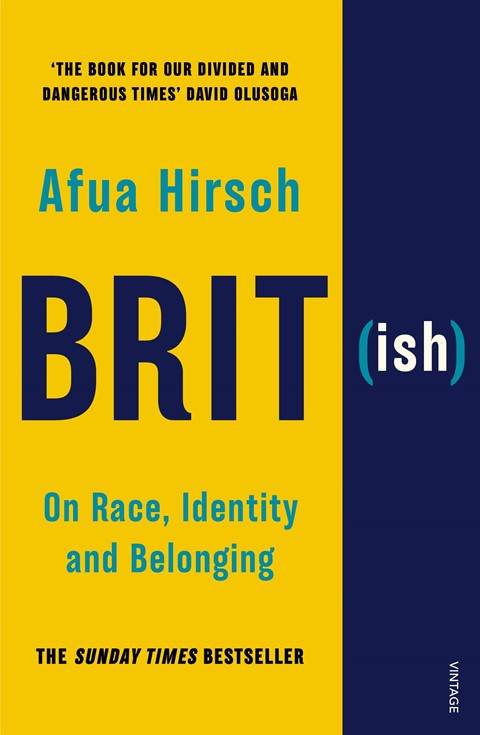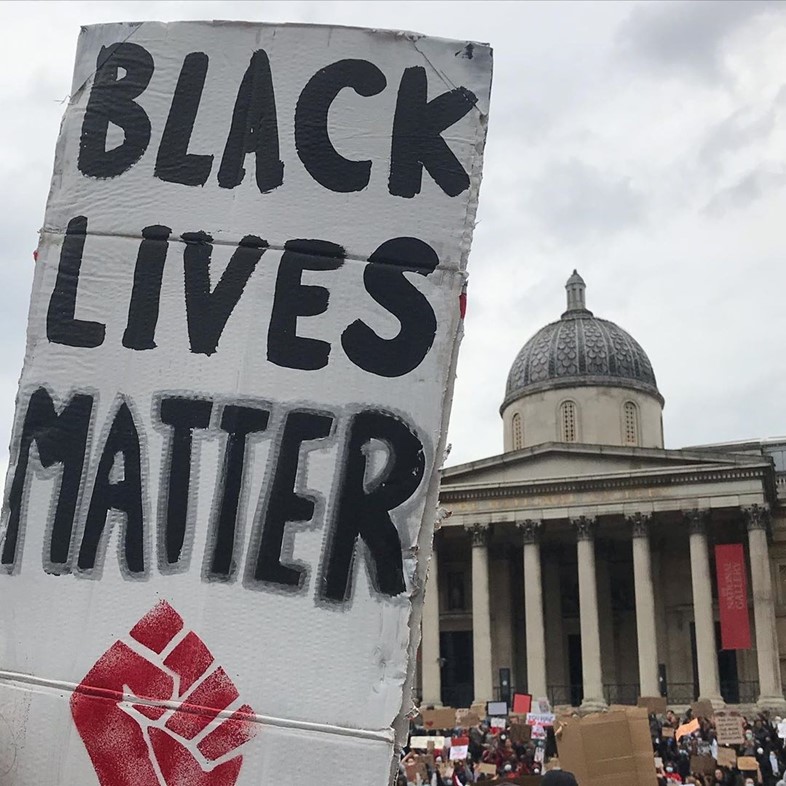The UK is not innocent in all this: In the wake of Black Lives Matter protests around the world, we have started an ongoing list of ways to join the anti-racist fight here in Britain, and educate yourself on this country’s race problem
In the wake of the Black Lives Matter protests taking place across the United States and the world, and the subsequent outpouring of activist sentiment on social media, it is more imperative than ever to continue momentum to make this a true moment of change. This of course leads to difficult questions for the white community, not least in the UK, where we must face up to our own failings as a country – racism, both overt and institutionalised, is not just an American problem.
We recommend reading the writer Afua Hirsch’s – who wrote Brit(ish): On Race, Identity and Belonging – piece in The Guardian this morning. “The racism that killed George Floyd was built in Britain,” ran the headline; in it, Hirsch outlines how Britain begun, and was complicit in, slavery, introduced apartheid across Africa and used “the appropriation of black land, resources and labour to fight both world wars and using it again to reconstruct the peace”. But also how “black people in Britain are still being dehumanised by the media, disproportionately imprisoned and dying in police custody, and now also dying disproportionately of Covid-19”.
This current moment is a well overdue time for action, particularly for those in the UK who are struggling to respond to the crisis in the US. Here, we have begun a list – which is ongoing – of practical ways to help fight racism and incite change in the UK, from challenging your MPs, donating, signing petitions, calling for changes in education, educating yourself on Britain’s race problem, supporting black-owned companies and protesting. We invite further suggestions by contacting us on our Twitter or Instagram.
Write to your MP
Writing to your Member of Parliament is a simple act which often results in direct action – we should all be doing it more often. The easiest way to do so is via WriteToThem, a website which allows you to simply type in your postcode and it will create an email outline to send to your MP. Some action points to consider (though please do check whether your MP has already taken action, and adjust accordingly):
- The immediate halt of the UK’s export of rubber bullets, tear gas and riot shields to the US after they have been used against peaceful Black Lives Matter protesters. As well as suspending, a comprehensive list of all current riot control projectiles exported by the UK, who they have been sent to and what they are being used for should be published.
- For the UK government, and your MP (if they haven’t already) to condemn Donald Trump’s threat of action against his citizens in the utmost manner – the UK’s silence will only allow for greater oppression.
- To call into question what will be done about the statistics about the greater death rate of BAME citizens of coronavirus in the UK, and to demand justice for Belly Mujinga, and those who suffered due to lack of PPE.
- To ask what is being done to ensure police brutality and racial bias within policing – with reports that members of the BAME community were 54 per cent more likely to be handed lockdown fines than their white counterparts – are not going unchecked in your constituency.
- After not addressing the issue at PMQs, ask your MP to put pressure on Prime Minister Boris Johnson to declare that Black Lives Matter.
You can find a good outline, free to use, by @cairoc here. But do your own research about your own area – there are plenty more requests that can be added to this list. And, when you’ve done so, take the equally short time it takes to email Gavin Williamson, Secretary of State for Education, to support The Black Curriculum’s campaign to address the lack of black history taught in UK schools. Head here for a template you can copy and paste – and donate too, if you have the funds.
Donate and sign petitions
- Black Lives Matter UK (BLMUK) is a coalition of black activists and organisers from across the country, advocating for justice in their communities since 2016 and seeking to “dismantle imperialism, capitalism, white-supremacy, patriarchy and the state structures”. Currently, their GoFundMe is seeking £500,000 of donations for education, activism, changes to lawmaking and aiding other anti-racist charities in the UK. You can donate here.
- Police brutality is not just a problem in the US, and the United Family & Friends Campaign seeks to bring justice to those who have suffered at the hands of the British policing system. Their GoFundMe page is for those who have suffered death in prison, in custody, and at the hands of police by campaigning for properly funded investigations, suspensions of involved officers, police accountability and more. Donate and find out more here.
- Belly Mujinga was working in Victoria Station when a man, who said he was infected with Covid-19, assaulted her by spitting at her. She fell ill days later and died on April 15. The police have chosen to close the case. Help by demanding justice – sign this petition to secure protection and support others like her at Govia Thameslink – and then donate to her memorial fund, with proceeds going to her young daughter.
- Black Protest Legal UK is a group of lawyers and legal advisors providing free legal advice and representation to UK Black Lives Matter protesters. After reaching their initial funding goal, they are now putting donations towards the broader aims of their organisation – contribute to their GoFundMe page here.
- Black Minds Matter UK was launched to help improve the mental health care available to the black community, particularly in this current moment whereby hospitals are underfunded and NHS therapy is not widely available. Funds will be used to pay for therapy sessions of those in need. You can donate here.
- One of the largest anti-racist forces in the UK, Stand Up to Racism has organised numerous marches and calls to action in both London and across the country, standing up not just for the black community, but also refugees, muslim communities, immigrants and more facing both institutionalised and overt racism. A basic membership costs just £2 per month. Sign up here.
- Far and away from the usual corporate Pride fundraisers, the newly founded Exist Loudly Fund, begun by youth worker and community activist Tanya Compas, helps queer black young people in the UK. Its aim is to create tangible change for this overlooked community with workshops, days out, mentoring, and the annual Queer Black Christmas. You can find out more and donate on the scheme’s GoFundMe page.
- Runnymede is the UK’s leading independent race equality think tank, working to build a body of evidence about key race equality challenges in Britain. Independent and not-for-profit, they run on charitable donations – find out how you can donate on their website.
- Founded in the memory of Stephen Lawrence, who was murdered in a racist attack in 1993, the Stephen Lawrence Charitable Fund seeks to work with young people from disadvantaged backgrounds to succeed in the career of their choice, with the aim of creating a fairer society in which everyone, regardless of their background, can flourish. Find out how you can donate and get involved here.
- The Black Curriculum reimagines the future of education through black British history, seeking to see black history taught to students aged eight to 16 year-round. As well as advocating for governmental change and creating comprehensive reports on the state of the current curriculum, they have already reached 1,000 students since September last year. Email Gavin Williamson to ask for governmental change – you can find a template here – as well as supporting financially.
- Stand Against Racism and Inequality (SARI) is a UK-based charity which provides support for victims of hate crimes. SARI also works in educating staff and pupils in schools about anti-hate behaviour. You can donate here.
- Founded in 1996, Show Racism the Red Card works in schools to provide anti-racism education to pupils and teachers via workshops, training and other resources. The organisation works with footballers (hence its name) to reach a wide range of people across the country. You can find out more here.
- Based in South London, The Advocacy Academy works with school students on social justice campaigns. The organisation’s programme empowers young people to enact change in their local area – by working with MPs and local councils – while still in their final years of school. You can find out more here.
- UK Black Pride supports people of Africa, Asian, Caribbean, Middle Eastern and Latin American descent within the LGBTQIA community in Britain, and its annual celebration (cancelled this year due to the Covid-19 pandemic) is the largest of its kind in Europe. Find out more and donate here.
- The KEASH Salon Hardship Fund has been set up to distribute money across four London hair salons whose futures are threatened by prolonged closing during the Covid-19 pandemic. Set up by Taiba, founder of KEASH, the fundraising initiative looks to support some of London’s key black-owned salons. You can donate here.
- In a fundraiser set up last week, the Black LGBTQIA+ Therapy Fund is raising money to pay for therapy sessions for black people in the LGBTQIA+ community. The fund’s organisers are working with mental health professionals and LGBTQIA+ charities on best care and reaching out to people who can benefit from the fund. You can donate here.

Buy from black-owned British businesses
Put your money where your mouth is. We have compiled an ongoing list of black-owned British businesses in the UK, spanning fashion, beauty, design and lifestyle which you can find here. You can also support US-based initiative 15 Percent Pledge which asks retailers to pledge at least 15 per cent of brands they stock be black-owned businesses – challenge department stores and multi-brand retailers you shop in to do the same. Other initiatives like the Black Women’s Directory – aiming to provide a comprehensive and ever-growing list of businesses and services run by black women – have also launched.

Educate yourself: books to read, podcasts to listen to
- gal-dem: Run by women and non-binary people of colour, gal-dem is an online and print publication based in London. The platform’s journalism prioritises the perspectives of those who might not otherwise be heard, and provides intelligent and vital commentary across politics and pop culture. Earlier this year, gal-dem launched a membership scheme, with various tiers starting from as little as £4 per month – as well as options to pay it forward, making membership available to someone who otherwise couldn’t afford it.
- Brit(ish): On Race, Identity and Belonging by Afua Hirsch: The debut book from writer and journalist Afua Hirsch is part memoir of her life as a mixed-race British woman, and part exploration of the UK’s historic – and continued – racism. An eye-opening study of the contradictions which abound in Britain today, Brit(ish) reveals a country in the midst of an “identity crisis”.
- The Good Immigrant by Nikesh Shukla: The Guardian described Nikesh Shukla’s The Good Immigrant as an “unflinching dialogue about race and racism in the UK”. The book is a collection of 21 essays by BAME writers who explore what it means to be an immigrant in the UK today – whether a first or second generation immigrant, a refugee or asylum seeker – and the varying standards immigrants are held to in a society with roots in imperialism.
- Natives: Race and Class in the Ruins of Empire by Akala: Rapper, intellectual and writer Akala’s debut book Natives seeks to debunk the British myth of meritocracy. Weaving his personal experiences with wider societal behaviour, Akala deftly addresses deep-rooted problems when it comes to race and class in the UK.
- Black and British: A Forgotten History by David Olusoga: “Black history is a series of missing chapters from British history,” the writer and historian David Olusoga told The Guardian as his book Black and British was published. Olusoga’s book explores these omissions, tracing the history of people of African and Caribbean origin in Britain back to Roman times and revealing both how they contributed to our society and the injustices they faced while doing so.
- Don’t Touch My Hair by Emma Dabiri: Academic and TV host Emma Dabiri’s Don’t Touch My Hair began with her own personal experience of feeling ashamed of her natural hair, but expands far beyond the individual to look at histories of how black people in Britain and around the world have been conditioned to think about their hair. Dabiri draws on little-known histories, traditions and larger political and pop culture movements, and looks at how black hair “can be understood as an allegory for black oppression and, ultimately, liberation”.
- Say Your Mind by Kelechi Okafor: The most recent episode of actor Kelechi Okafor’s podcast Say Your Mind, entitled ‘Would You Switch Places With a Black Person?’, looks at some of the reactions to the murder of George Floyd in Minneapolis. The weekly podcast features intelligent (and entertaining) discussions around tarot, current events and pop culture.
- Mother Country: Real Stories of the Windrush Children by Charlie Brinkhurst-Cuff: Mother Country is a collection of stories exploring the experiences of Britain’s Windrush generation, told by members’ children and grandchildren. Edited by journalist and gal-dem head of editorial Charlie Brinkhurst-Cuff, Mother Country is an insight into the history of the British Caribbean community, and how it remains significant today.
- About Race with Reni Eddo-Lodge: Eddo-Lodge is the author of the groundbreaking Why I’m No Longer Talking to White People About Race, and her podcast seeks to carry the conversation she prompted with her book further by speaking with those who have been central to the UK’s anti-racism fight in recent decades.
- Stories that Stick from Blacticulate: A podcast series that focuses on empowering everyday stories, Stories that Stick – from Blacticulate, which creates podcasts and workshops aimed at elevating positive stories from underrepresented communities – releases fortnightly interviews with creatives and storytellers who discuss moments of impact in their lives.
Protest
A protest in London’s Hyde Park took place yesterday; more are planned over the weekend, with a protest at Parliament Square on Saturday from 1pm, and on Sunday at 2pm outside the US Embassy. Those who attend are advised to remain socially distant – and to wear masks and other forms of PPE where possible. Dazed has compiled an article on How to Protest Safely During a Pandemic, while legal advice from the Green and Black Cross can be found here.
Before you join, it is worth reading this infographic by @practicalmyth which addresses protesting during a pandemic, encouraging those who wish to protest to rethink traditional forms of protest in the UK, from socially distanced walk-outs to keeping your children out of school. A socially distanced protest, organised by Black Lives Matter UK, will take place this evening (Thursday 4), asking people to come to their doorsteps in solidarity at 7pm.
